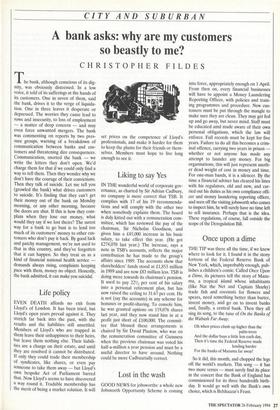CITY AND SUBURBAN
A bank asks: why are my customers so beastly to me?
CHRISTOPHER FILDES
The bank, although conscious of its dig- nity, was obviously distressed. In a low voice, it told of its sufferings at the hands of its customers. One in seven of them, said the bank, drives it to the verge of liquida- tion. One in three leaves it desperate or depressed. The worries they cause lead to rows and insecurity, to loss of employment — a matter of deep concern — and may even force unwanted mergers. The bank was commenting on reports by two pres- sure groups, warning of a breakdown of communication between banks and cus- tomers and threatening dire consequences. Communication, snorted the bank — we write the letters they don't open. We'd charge them for that if we could only find a way to tell them. Then they wonder why we don't have the courage of their convictions. Then they talk of suicide. Let me tell you (growled the bank) what drives customers to suicide. It's finding that they can't get their money out of the bank on Monday morning, or any other morning, because the doors are shut. If this is how they com- plain when they lose our money, what would they say if we lost theirs? The surest way for a bank to go bust is to lend too much of its customers' money to other cus- tomers who don't pay it back. By good luck and patchy management, we're not used to that in this country, and they've forgotten that it can happen. So they treat us as a kind of financial national health service — demands always rising, complaints keeping pace with them, money no object. Honestly, the bank admitted, it can make you suicidal.


























































 Previous page
Previous page